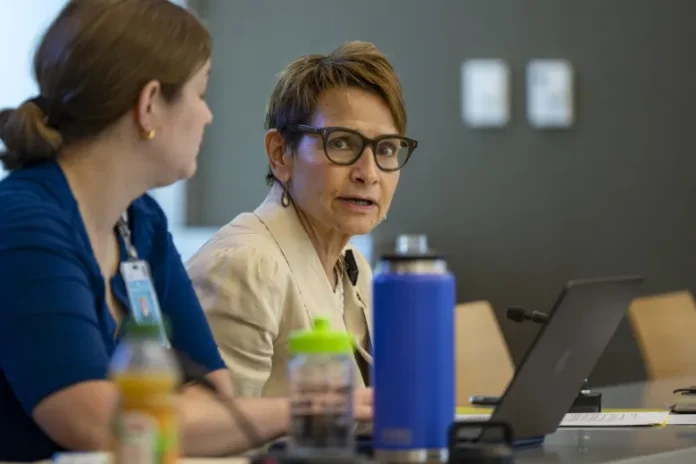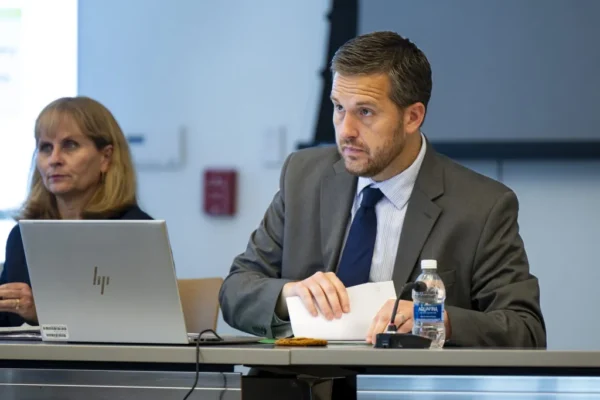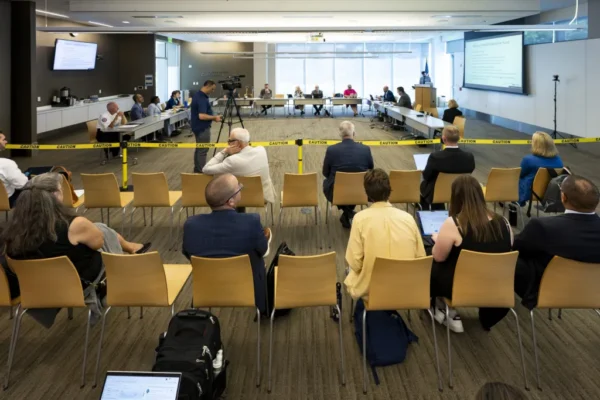
This story was originally published on Mirror Indy.
By MARY CLAIRE MOLLOY
It’s a challenging year for public health in Indiana.
State lawmakers cut $38 million used to cover the cost of medical care at Eskenazi Health for low-income or uninsured patients.
Gov. Mike Braun’s budget included steep slashes to Health First Indiana, a new program that provided more funding for local health departments. That included a 70% loss in Indianapolis, where officials are trying to lower infant and maternal mortality rates.
And the Trump administration’s “One Big Beautiful Bill” could leave millions uninsured nationwide due in part to cuts to Medicaid, a federal program that covers about one in four Hoosiers.
These realities are coming to a head as the budget process begins for the top health agency in Indianapolis, a city with some of the highest hospital costs in the country, where 15% of residents also live below the poverty line.
“We’re facing about a $125 million loss,” James Simpson, the interim CFO and treasurer of the Health and Hospital Corporation of Marion County said during a July 29 budget presentation.

The corporation operates the Marion County Public Health Department, Eskenazi Health, Indianapolis Emergency Medical Services and dozens of nursing homes across the state. Altogether, it has a bigger budget than the entire city of Indianapolis.
Simpson shared the numbers with HHC’s board of trustees, which is made up of seven members appointed by the mayor, City-County Council and county commissioners. After several hearings in August, they will vote on whether to approve the budget and forward it to the council.
“The loss of funding for the indigent in Marion County will be the most impactful,” Curt Brantingham, a spokesperson for HHC, wrote in an email to Mirror Indy. “Eskenazi is our community’s safety net.”
For more than a decade, the state has provided millions each year to support patients who can’t pay for care at Indy’s public hospital system. This year, HHC lobbied hard for the funding to continue — even launching an ad campaign aimed at Gov. Braun.
It wasn’t successful.
“Those revenues we know, as of today, are gone forever,” Simpson said.
One solution HHC proposed is maximizing the property tax dollars it can receive through Marion County to pull an additional $25 million, which would cover some of the costs for providing medical care at Eskenazi to uninsured patients. That still wouldn’t be enough to cover the full loss of state funding — and it would divert money from other public services that rely on property taxes.

‘They will flood the emergency departments’
It helped that the Marion County Public Health Department was able to absorb the $16.7 million decrease in Health First Indiana funding, Simpson said.
The program, started by former Gov. Eric Holcomb, funneled $225 million into local health departments over the last two years to improve access to basic services. Now, with the new administration’s cuts, health agencies across the state will share only $40 million annually between them in 2026 and 2027.
As this new reality sets in, Finance Director Tara Parchman told board members, Indy’s health department is working to preserve staffing and essential services.
But grants also have taken a hit.
Get the backstory
The health department used Health First Indiana dollars to give out at least 80 grants to community organizations working to improve issues such as chronic disease, lead exposure, maternal health and immunization rates.
With the funding cuts, Parchman said, those awards won’t last after 2026. “We will not be able to sustain that level of support,” she told board members.
Other top officials issued similar warnings during the meeting — this time, about decisions at the federal level.
“We are concerned about the impact of cuts on Medicaid enrollment,” said Dr. Lisa Harris, the CEO of Eskenazi Health. “When people avoid primary or preventive care, they will flood emergency departments.”
The end result?
The health system will be strained, she said, leaving all of us to pick up the bill — or stuck in the waiting room.
Mirror Indy reporter Mary Claire Molloy covers health. Reach her at 317-721-7648 or email maryclaire.molloy@mirrorindy.org. Follow her on X @mcmolloy7.



